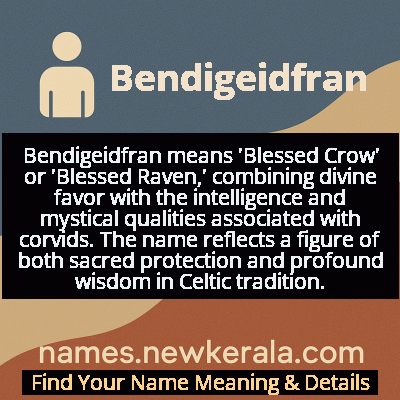Bendigeidfran Name Meaning & Details
Origin, Popularity, Numerology Analysis & Name Meaning of Bendigeidfran
Discover the origin, meaning, and cultural significance of the name BENDIGEIDFRAN. Delve into its historical roots and explore the lasting impact it has had on communities and traditions.
Name
Bendigeidfran
Gender
Male
Origin
Celtic
Lucky Number
8
Meaning of the Name - Bendigeidfran
Bendigeidfran means 'Blessed Crow' or 'Blessed Raven,' combining divine favor with the intelligence and mystical qualities associated with corvids. The name reflects a figure of both sacred protection and profound wisdom in Celtic tradition.
Bendigeidfran - Complete Numerology Analysis
Your Numerology Number
Based on Pythagorean Numerology System
Ruling Planet
Saturn
Positive Nature
Ambitious, efficient, realistic, and authoritative.
Negative Traits
Materialistic, stressed, confrontational, and can be overly ambitious.
Lucky Colours
Dark blue, black.
Lucky Days
Saturday.
Lucky Stones
Blue sapphire, amethyst.
Harmony Numbers
2, 4, 6.
Best Suited Professions
Business leaders, managers, financial services, law enforcement.
What People Like About You
Leadership, determination, organizational skills.
Famous People Named Bendigeidfran
Bendigeidfran fab Llŷr
Mythological King
Legendary giant king of Britain in Welsh mythology, central figure in the Second Branch of the Mabinogion
Bran the Blessed
Celtic Deity/King
Proto-Celtic god-king figure who evolved into the Welsh Bendigeidfran, associated with sovereignty and protection
Bendigeidfran ap Cunedda
Early Medieval Ruler
Historical figure who may have inspired later mythological accounts in post-Roman Britain
Name Variations & International Equivalents
Click on blue names to explore their detailed meanings. Gray names with will be available soon.
Cultural & Historical Significance
His mythological role extends beyond mere kingship to that of a protector deity. The placement of his head facing France as a protective talisman reflects the Celtic practice of using sacred heads as guardians. Bendigeidfran's story also illustrates the Celtic concept of sacred kingship, where the king's physical well-being was tied to the land's fertility and prosperity. His wounding and subsequent burial represent the mythological pattern of the wounded king whose suffering affects the entire kingdom, a theme that would later influence Arthurian legends and the Grail cycle.
Extended Personality Analysis
Individuals named Bendigeidfran are typically perceived as possessing immense inner strength, profound wisdom, and a deep sense of responsibility toward others. They embody the archetype of the protective guardian - often taking on leadership roles naturally and demonstrating remarkable loyalty to family and community. Their strength is not merely physical but moral and intellectual, showing exceptional judgment in difficult situations and the ability to see the bigger picture when others cannot. Like the mythological king, they tend to be generous to a fault and willing to make great personal sacrifices for the greater good.
However, this noble character often comes with a tragic dimension. Bendigeidfran personalities may struggle with the weight of their responsibilities and the consequences of their decisions, particularly when their trust is betrayed. They possess a deep emotional intensity that can make them vulnerable to profound disappointment, yet they maintain their dignity even in defeat. Their wisdom often comes from experiencing great personal loss, and they have the remarkable ability to provide guidance and protection even from a position of weakness or suffering, much like the speaking head of the mythological king.
Modern Usage & Popularity
In contemporary times, Bendigeidfran remains an extremely rare given name, primarily used within Welsh-speaking communities and among families with strong Celtic heritage connections. Its usage is almost exclusively confined to Wales, where it appears occasionally as a traditional name honoring mythological heritage rather than following naming trends. The name sees slightly more frequent use in literary contexts, academic discussions of Celtic mythology, and within pagan or druidic communities where ancient names are revived for spiritual significance. There has been no significant modern popularity trend for this name, as its length, complexity, and strong mythological associations make it challenging for everyday use in most English-speaking contexts.
Symbolic & Spiritual Meanings
Bendigeidfran symbolizes the union of divine blessing with earthly sovereignty, representing the ideal of the sacred king who serves as both ruler and protector. The name carries profound symbolism of sacrifice and eternal guardianship - the idea that true leadership involves personal cost and that wisdom can transcend physical death. The raven or crow element connects to Celtic symbolism where these birds represented prophecy, battle, and communication between worlds. The 'blessed' component suggests a figure touched by the divine, chosen for a special destiny that serves the community rather than personal ambition. Together, these elements create a powerful symbolic representation of protective wisdom that endures beyond physical limitations and continues to guide and defend even from beyond the grave.

